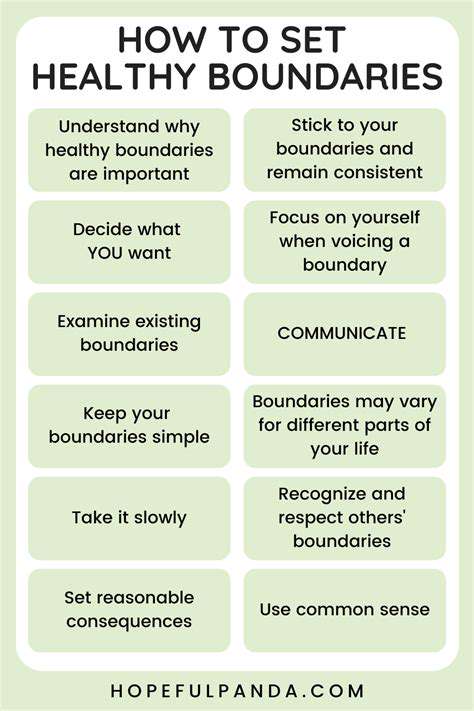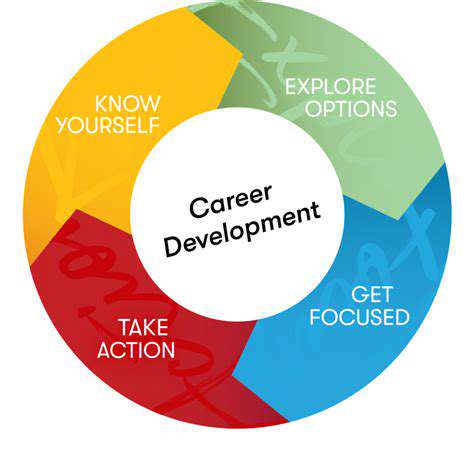How to Build a Stronger Relationship with Yourself
Practicing Self-Compassion and Forgiveness
Understanding the Importance of Self-Compassion
Self-compassion is a crucial element in building a stronger relationship with ourselves, and consequently, with others. It involves treating ourselves with the same kindness, understanding, and support that we would offer a friend struggling. When we experience setbacks or make mistakes, self-compassion allows us to acknowledge these moments with empathy rather than harsh self-criticism. This compassionate approach fosters a more positive inner dialogue, reducing stress and promoting emotional well-being, which in turn strengthens our capacity for healthy relationships.
Cultivating self-compassion is not about ignoring our flaws or shortcomings. Instead, it's about recognizing that imperfection is part of the human experience. By embracing our vulnerabilities and mistakes with kindness, we create a space for growth and learning, fostering resilience and a more compassionate approach to ourselves and others.
Identifying and Challenging Negative Self-Talk
A significant aspect of practicing self-compassion involves recognizing and challenging the negative self-talk that often sabotages our well-being. We often engage in harsh inner dialogues, berating ourselves for perceived failures or shortcomings. Identifying these negative patterns is the first step. Once we become aware of these critical voices, we can begin to challenge their validity and replace them with more compassionate and supportive internal messages.
This process often requires conscious effort and practice. We need to actively question the accuracy and helpfulness of these negative thoughts. Are they based on facts or assumptions? Are they truly constructive, or are they simply perpetuating negative emotions? By engaging in this critical self-reflection, we can begin to reframe our self-perception and cultivate a more positive internal dialogue.
Forgiving Yourself for Past Mistakes
Forgiving ourselves for past mistakes is an essential component of self-compassion. Holding onto resentment and guilt regarding past actions can create a heavy emotional burden, hindering our ability to move forward with a clear conscience. Acknowledging past mistakes and shortcomings without judgment is a powerful step towards healing and personal growth.
This process involves accepting that mistakes are a part of life's journey. It's not about condoning harmful actions, but rather about releasing the emotional grip of the past. When we can forgive ourselves, we free ourselves from the chains of regret and allow ourselves to focus on the present and future with renewed hope and determination. This, in turn, fosters a more positive outlook on life and strengthens our ability to build healthy relationships.
Practicing Self-Compassionate Actions
Self-compassion isn't just a mindset; it's also about taking specific actions to nurture ourselves. This might involve engaging in activities that bring us joy, such as spending time in nature, pursuing hobbies, or connecting with loved ones. It also involves prioritizing our needs and taking breaks when we're feeling overwhelmed.
These actions help us create a space for self-care and emotional regulation. By prioritizing our well-being, we create a stronger foundation for building healthy relationships with ourselves and others. This conscious effort to nurture our emotional well-being is a powerful way to build a stronger sense of self-worth and self-acceptance.
The Interconnection Between Self-Compassion and Relationship Building
Self-compassion significantly impacts our ability to build and maintain healthy relationships. When we treat ourselves with kindness and understanding, we're more likely to extend the same compassion to others. This creates a ripple effect, fostering empathy, understanding, and support within our relationships.
Furthermore, self-compassion allows us to approach relationships with a more realistic and balanced perspective. We're less likely to be overly critical of ourselves or others, and more open to accepting imperfections and navigating disagreements with grace and understanding. This creates a more supportive and nurturing environment for all involved.


Seeking Support and Encouragement

Finding a Supportive Network
Seeking support and encouragement is a crucial step in navigating life's challenges. Building a network of trusted individuals who understand your struggles and can offer encouragement is essential for maintaining a positive outlook and fostering resilience. These individuals can provide emotional support, practical advice, and a listening ear during difficult times. This support network can act as a safety net, helping you feel less alone and more capable of overcoming obstacles.
A supportive network can be composed of family members, friends, colleagues, or even mentors. It's important to identify individuals who can offer genuine support and encouragement, rather than those who may be judgmental or unhelpful.
Understanding Your Needs
Recognizing and understanding your specific needs is fundamental to seeking appropriate support. This involves self-reflection and honestly assessing the areas where you require assistance. Identifying your vulnerabilities and acknowledging the challenges you face allows you to proactively seek the support you deserve. It is also important to communicate these needs clearly to those around you who can help.
This process of self-awareness is a continuous journey, and it's crucial to periodically assess your needs and adjust your support system accordingly. As your circumstances change, your support requirements may evolve, and you should be prepared to adapt your network to meet these evolving needs.
The Power of Positive Self-Talk
Cultivating a positive internal dialogue is incredibly valuable in fostering self-encouragement. Replacing negative thoughts with positive affirmations can significantly impact your emotional well-being. Focusing on your strengths and capabilities can boost your confidence and motivate you to pursue your goals.
Positive self-talk is a proactive approach to mental well-being. Consistent practice can lead to more self-acceptance and emotional resilience in the face of adversity.
Seeking Professional Guidance
Don't hesitate to seek professional guidance when needed. Therapists, counselors, or other mental health professionals can offer valuable support and strategies for navigating challenging emotions and situations. Their expertise can provide a structured approach to addressing specific concerns and developing coping mechanisms. They can also help you identify patterns and develop healthier ways of responding to stressful situations.
Embracing Self-Care Practices
Prioritizing self-care is paramount for maintaining emotional well-being and resilience. Engaging in activities that promote relaxation, rejuvenation, and a sense of peace, such as meditation, yoga, or spending time in nature, can create a buffer against stress. These practices help nurture your emotional and physical health, enabling you to better cope with life's inevitable challenges.
Incorporating self-care into your routine is an investment in your overall well-being. This can lead to improved mental clarity, increased emotional regulation, and a greater capacity for handling stress.
The Importance of Patience and Perseverance
Seeking support and encouragement is an ongoing process, and it's essential to be patient with yourself throughout the journey. Progress may not always be linear, and setbacks are inevitable. It's important to acknowledge these setbacks without letting them derail your progress. Persisting through challenges and maintaining a hopeful outlook are vital components of personal growth.
Remember that building resilience and finding support are ongoing processes. Be kind to yourself, celebrate your successes, and learn from your setbacks. Continued effort and perseverance will ultimately lead to greater self-awareness and a more positive outlook on life.

![Guide to Learning About [Specific Topic, e.g., Climate Change]](/static/images/31/2025-05/TheUnfoldingImpactsofaChangingClimate.jpg)

![How to Style Your Shelves [Decor Tips]](/static/images/31/2025-06/AccessorizingYourShelvesforaPolishedLook.jpg)


![How to Care for Orchids [Tips & Tricks]](/static/images/31/2025-07/FertilizingYourOrchidforMaximumBlooms.jpg)




